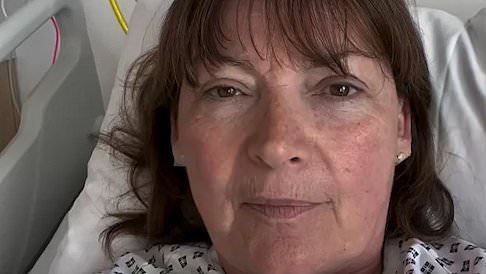Lorraine Kelly took to X, formerly Twitter, on Wednesday to issue an update on her health after undergoing surgery to remove her fallopian tubes and ovaries.
The veteran ITV presenter, 65, previously shared a video from her hospital bed on Saturday, revealing that she was having the operation.
Reassuring fans, she explained she was being well looked after and that the surgery was for ‘purely preventative’ reasons, after she’d been unwell for some time.
And now the chat show host has revealed some positive news to her social media followers and even gave an exciting update on her popular programme.
She said: ‘Thanx for all your lovely messages I’m recovering well. So proud of my top team – punching above our weight and bucking the trend.
‘Just heard our ratings are up – we had the highest March for four years. Thanks @vixkennedy and the gang! Always know how to cheer me up [love heart]’

Lorraine Kelly took to X, formerly Twitter , on Wednesday to issue an update on her health after undergoing surgery to remove her fallopian tubes and ovaries (pictured on Saturday)

The TV host issued some positive news to her social media followers and even gave an exciting update on her popular programme (pictured in April)
The encouraging message comes after she confirmed on Sunday that she was back home and recuperating as she heaped praise on the hospital staff and her surgeon for being so ‘kind’ and ‘caring’.
The host shared a snap of herself surrounded by healthcare professionals, sitting in a wheelchair and wearing a T-shirt paying tribute to her late friend Dame Deborah James.
Alongside, the TV star gushed: ‘Huge thanks to these kind, caring, gorgeous professionals who took care of me at @heatherwoodhospital – back home now and following doctors orders to rest up.
‘My surgeon Mr Ahmed Rafaat has been so reassuring throughout – and I can’t thank the whole team enough!’
Lorraine was soon flooded with well wishes from her fans and famous friends, with Emma Willis writing: ‘Lots of love Lorraine ❤️’ and Christine Lampard commenting a string of heart emojis.
Sir Chris Hoy added: ‘Get well soon, Lorraine’ while Vanessa Feltz penned: ‘Enjoy a bit of convalescence with your beautiful girls’.
Dr Amir Khan wrote: ‘So glad you’re home, what a fantastic team’, while Strictly’s Amy Dowden shared: ‘Sending lots of love’ and Sara Cox said: ‘Rest up & relax xxx’.
Gaby Roslin commented: ‘Get well soon my darling. Big love ❤️’ and Loose Women’s Katie Piper added: ‘Glad you are home. Rest up’.

She said: ‘Thanx for all your lovely messages I’m recovering well. So proud of my top team – punching above our weight and bucking the trend’

The encouraging message comes after she confirmed on Sunday that she was back home and recuperating

The ITV presenter heaped praise on the hospital staff and her surgeon for being so ‘kind’ and ‘caring’
Announcing her surgery the day before, Lorraine told fans: ‘Just wanted to let you know I’m having a wee procedure today.
‘I’ve not been feeling all that well for a little while, so I had some scans and tests, and I have to have my ovaries and my tubes taken out.
‘It’s purely preventative. It’s going to be with keyhole surgery, which is incredible, I’m being very well looked after, and I’ll obviously see you really soon, and I’m gonna be totally fine.’
She added in the caption: ‘Getting keyhole surgery – all preventative – feel very lucky to be treated so well – thank you Dr Raafat and all the staff!’
The procedure to remove the ovaries and fallopian tubes is known as an laparoscopic bilateral salpingo-oophorectomy and is typically done preventively to remove the risk of developing ovarian cancer.
According to the NHS, it is suggested you stay off work for two to four weeks after having the surgery, meaning Lorraine may have to take a break from presenting her daytime show.
